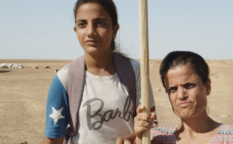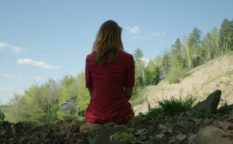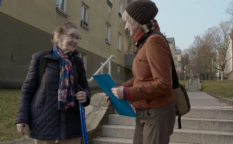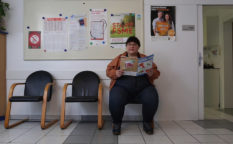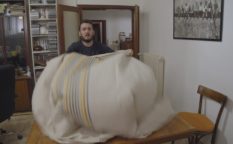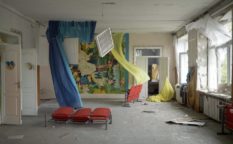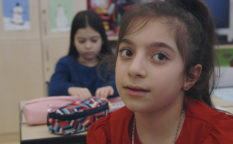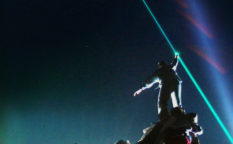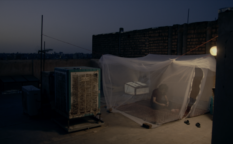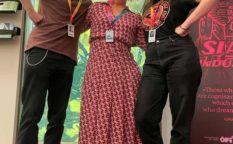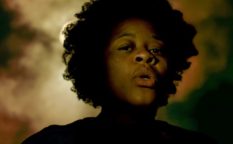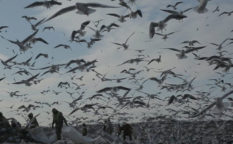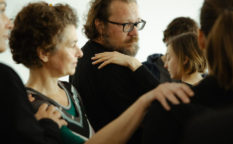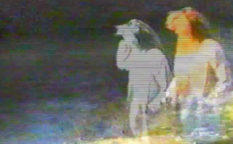Review: Prayer for a Lost Mitten (2020)
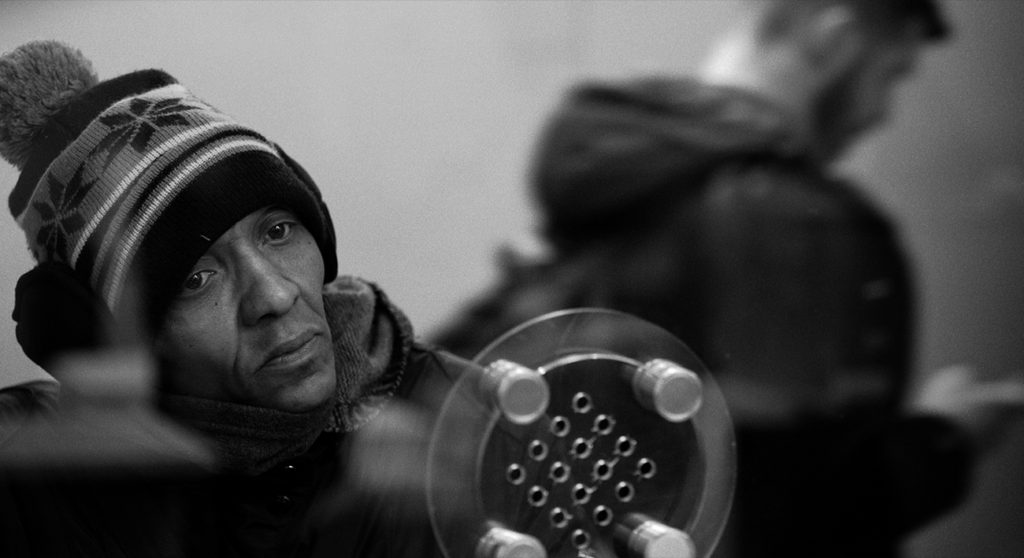
There is a certain classical elegance to the opening of Prayer for a Lost Mitten. The screen fills with an infinity of snowflakes gently falling over a nocturnal Montreal while a solitary clarinet plays that kind of jazz, melancholy yet warm, which seems like an invitation to cuddle up under a blanket with a good book while it plays, preferably on vinyl. In that incipit, the philosophical element in the combination of unison and multiplicity, of the evanescent and the profoundly textural, is transcended by the contemplative poetry of it all. Director Jean-François Lesage uses duration in a way that ensures that atmosphere prevails over concept, and that we are lastingly absorbed in the fabric of his monochrome reverie, even as that clarinet starts sparking reminiscences of other lone musicians, blowing their dreamy blue notes for a coin amidst fast-paced crowds of commuters we will never see together in this film.
Indeed, more than ever, Lesage’s fifth feature-length work – world premiered at Visions du Réel in the Burning Lights International Competition, then crowned Best Canadian Documentary upon its return home at Hot Docs – is all about extraction and separation, at least in the beginning, although there is no violence whatsoever here, in the representation of it. Thus the first scene softly fades into the second, considerably more mundane if it were not for the above-mentioned class, undeniable if unassuming, and we end up at the lost and found desk of Montreal’s transport department.
At this point, as people of all ages and conditions start describing, one by one, the things that they are missing, ranging from a knitted cap to a pink satchel with butterflies on it or a set of keys, it almost feels like the film could veer into the vignette-prone, often humorous territory of Peter Greenaway’s herbariums. But too much vulnerability is exposed here for the horizontal dimension of a collection or typology to account for it. In fact, for each person, it is quite clear that whatever object they had on them and lost is not a ‘thing’ in the consumerist sense of Georges Pérec’s novella Les Choses. Hence they seem to feel they have to justify their attachment to these items of no intrinsic value, when that in itself makes it quite obvious that however insignificant they may seem, the missing objects are much more important than mere possessions, giving (lost) ‘property’ a whole other, very intimate meaning. Not only do they come feeling deprived, but they also tend to bare the innermost fibers of their beings, sitting there alone at this naked white desk as if it were a confessional or a place of therapy.
The existential disarray manifested by these ordinary individuals is captured by the camera with a sensitivity which brings to mind The Office (Urzad), a heart-wrenching film-school short shot by Kieslowski in 1966 at the counter of a Social Security office, placing face to ‘face’ the fragility of a constellation of citizens and the indifference of the administration. But in Lesage’s case, even though ‘the other side’ is never seen, someone is listening from across the desk, silently, as if to let the stream of feelings flow unhindered and grow into proper life stories reduced to their essence, finding their roots in childhood and extending beyond that counter back into the outside world, all the while followed by the camera in the gentlest, most organic way.
In his previous works, every bit as poetic, Lesage caught unnoticed fragments of lives, or wandered through the present as it happened. But the therapist’s approach he chooses here, seamlessly combining the meditative mood set in the first scene and the use of the more ‘realistic’ admin desk device, has an interesting, passively active, drifting quality which somewhat redefines the way observational documentary filmmaking works. The final sequence, rather dynamic if snowy and muffled, with an electronic music accompaniment to match, shows various paths being traveled simultaneously, even seems to suggest, with that same understated elegance present since the first scene, that there is no contradiction in guiding the narrative whilst still not intervening, just like there is nothing absurd in praying for a forlorn fingerless glove.
Original title: Prière pour une mitaine perdue
Year: 2020
Runtime: 79′
Country: Canada
Language: French, English, Creole
Written and directed by: Jean-François Lesage
Cinematography by: Marianne Ploska
Editing by: Mathieu Bouchard-Malo and Ariane Pétel-Despots
Sound recording by: Marie-Andrée Cormier
Sound design: Marie-Pierre Grenier
Music: Tom Brunt
Produced by: Les Films de l’Autre, Jean-François Lesage


